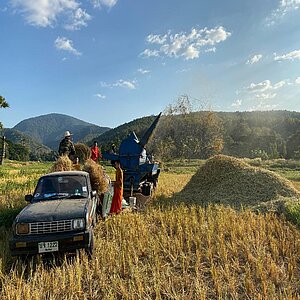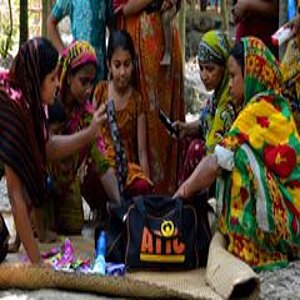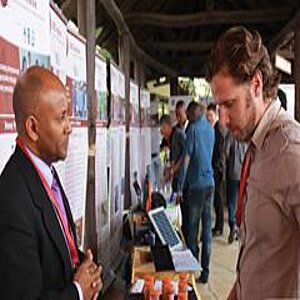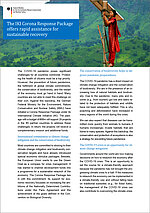Financing and capacity building for micro and small Climate-smart Enterprises: Filling the gap of the missing middle
Small and medium-sized enterprises (SMEs) make significant contributions to climate protection by developing and offering innovative services and products for greenhouse gas mitigation or to adapt to the consequences of climate change. The project combines the development of knowledge and resources for socially-inclusive and climate-friendly SMEs by supporting a favourable institutional framework. As part of the Corona Response Package, the SEED project supports inclusive and sustainable enterprises at different stages, from start-up to growth and scaling. Selected start-ups receive the “Low Carbon Award”, which, in addition to the prize money, also includes technical accompanying measures. Innovative business ideas are disseminated and cooperations for a resilient, green and socially-integrative economy are launched via the high-profile award ceremony, web-based tools, virtual platforms and personal exchange formats.
- Countries
- Ghana, India, Indonesia, South Africa, Thailand, Uganda
- IKI funding
- 7,340,437.74 €
- Duration
- 04/2013 till 06/2024
- Status
- open
- Political Partner
-
- Diverse climate change relevant institutions in the respective partner countries/Diverse klimarelevante Institutionen in den entsprechenden Partnerländern
- Implementing Partner
-
- Global Village Energy Partnership (GVEP)
- Nexii
- United Nations Development Programme (UNDP)
- United Nations Environment Programme (UN Environment)
State of implementation/results
- The project combines knowledge and resource building for socially inclusive and climate-friendly small and medium-sized enterprises (SMEs) with the promotion of enabling institutional frameworks, and extends this offering with a combination of green recovery-related topics.
- To date, numerous winners have been awarded the "SEED Low Carbon Award" in public ceremony, including participants from Ghana, India, Indonesia, South Africa, Thailand and Uganda. The startups receive proven SEED training programs (conducted in collaboration with local business development service providers) to improve and expand their business models.
- To improve access to finance for socially inclusive and climate-smart SMEs, Practitioner Labs Climate Finance were held in South Africa, Ghana, Indonesia, India, Thailand, and Uganda from 2019 to 2022. The Labs promote the design, development, and implementation of prototype financial products and instruments in the areas of climate adaptation and greenhouse gas mitigation.
- SEED conducted national policy dialogues in South Africa, Ghana, Thailand, India, Uganda, and Indonesia.
- In cooperation with local actors and organizations, national SEED hubs are being established in Uganda, Ghana, South Africa, Indonesia, India and Thailand. The national hubs are direct contacts for SMEs on the ground, provide local networks and coordinate the activities pending in the project in the respective country.
- In 2022, SEED celebrated 20 years of promoting a sustainable future. In its 20 years of existence, SEED has supported more than 2,000 companies and trained more than 500 business development providers in 41 countries, as well as collaborated with 950 organizations in Latin America and the Pacific, Africa and Asia.
- In the context of the "SEED Stories" project case study series, SEED published four video case studies on four IKI-funded companies from South Africa and Uganda. Recognising their potential to curtail carbon emissions, manage waste efficiently, and contribute to community education.
- To explore partnerships for the Coalition for Innovation, Circularity and Entrepreneurship (CICE) driven by SEED, SEED held a series of bilateral meetings with UNEP, UNIDO, ILO, FAO, DG Environment, DG INTPA, OECD, ICC, the Global Entrepreneurship Center, and Ecopreneur. The aim of the partner meetings was to sharpen CICE's work program and identify synergies and potential with partners.
- SEED has been also very active at COP28, organising 3 events, co-organising a 4th one, and contributing as to the panel of 4 other events. All had a common aim: advocating for the pivotal role of SMEs as gamechangers in the transition to circular and low-carbon economies.
- SEED organised and hosted three side events at high-level global events: “Jobs Redesigned: Exploring Circular Economy Solutions in the Private Sector” at World Resource Forum 2023 on September 6th, “Agrifood Transformation for the SDGs: Innovations and SMEs as the gamechangers” at UN Food Systems Summit +2, Rome, Italy on July 26th, and “Eco-inclusive SMEs facilitating transformative change for Nature, Climate, Circular- and Agrifood-Systems” at High Level Political Forum (HLPF) 2023, New York, United States on July 13th. These events were attended by both SEED and SEED-supported enterprises.
Latest Update:
04/2024
Further links
- Event: Jobs Redesigned: Exploring Circular Economy Solutions in the Private Sector - SEED and Circular Economy Catalyst Co-Host WRF23 Side Event
- Video SEED Case Study: Instellar Indonesia
- Event: Agrifood Transformation for the SDGs: Innovations and SMEs as the gamechangers – SEED FAO Side Event at UN Food Systems Summit +2
- Event: Eco-Inclusive SMEs facilitating transformative change for Nature, Climate, Circular- and Agrifood-Systems delivering towards the SDGs
- SEED case study: Yoddoi Organica coffee from Thailand
- SEED Case Study: GooGreens from Thailand
- SEED Case Study: SunnyCotton from Thailand
- SEED Case Study: Find Folk from Thailand
- SEED Female Entrepreneurship Month
- Article: Eco-Inclusive SMEs facilitating transformative change at HLPF 2023
- Article: Ekonnect Knowledge Foundation to host SEED India Hub
- Article: Spotlight on Circular Innovation: SMEs Leading the Way at WRF23 Side Event
- Article: SEED participates at the World Investment Forum 2023
- Article: SEED participates in various COP28 events
- Article: SEED at COP28: Advocating for the role of SMEs
- Article: SEED: 2023 Highlights
- Article: SEED Hub Indonesia: Stregthening the Enterprise Support Ecosystem
- Article: Insights from the case Studies in Uganda and South Africa
- Youtube. Kyaffe Coffee Briquette – SEED Case Studies Uganda
- Youtube: Little4tokens – SEED Case Studies South Africa
- Youtube: EcoPick (U) Ltd – SEED Case Studies Uganda
- Youtube: Preserve Botanica – SEED Case Studies South Africa
Project relations
Legend:
The link has been copied to the clipboard




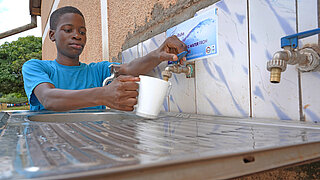


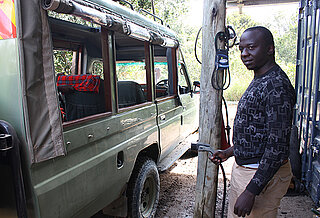
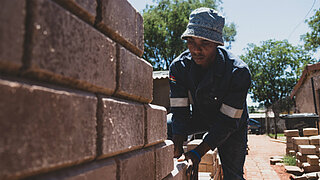

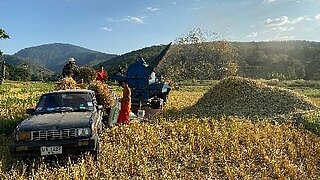
![[Translate to English:]](/legacy/_processed_/5/5/csm_Indien_EE_Solar_Frau_bfcf99c425.jpg)
